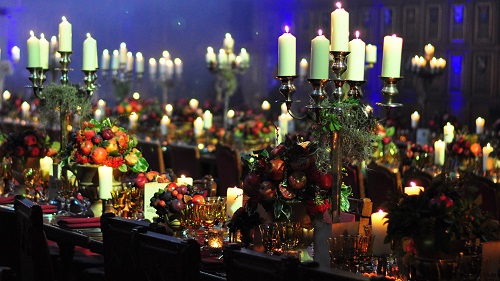
Dugdale’s Origines Juridiciales provides a wonderful description of the Christmas revels of the Inner Temple in the late Elizabethan period. In Dugdale’s time, there were around 200 barristers and students in the Inner Temple; a majority of them lived onsite at the Temple and their lives were linked, spatially and socially, much more closely to the Temple itself and to one another than is the case today. The Christmas “revells” were the highlight of the year and the scene of much merry-making and ritual. Officers would be elected to conduct the revels, including a King of Arms, a King of Cockneys and a Lord of Misrule.
I present a story told in Origines of a visitor to the Temple encountering a spectral figure who teaches him the true meaning of Christmas (or something like that);
After I had travailed through the East parts of the unknown world, to understand deeds of arms, and so arriving in the fair river of Thames, I landed within half a league from the City of London. Drawing near the city, suddenly I heard the shot of double cannons, in so great a number and so terrible, that it darkened the whole air. Wherewith, although I was in my native country, yet stood I amazed not knowing what it meant.
Thus, as I abode in despair, either to return or continue my former purpose, I chanced to see coming towards me an honest citizen clothed in a long garment, keeping the high way, seeming to walk for his recreation, which prognosticated peace rather than peril. Of whom I demanded the cause of this great shot. He friendly answered, It is, quoth he, a warning shot to the Constable Marshall of the Inner Temple, to prepare to dinner.
Why, said I, is he of such estate that seeketh no other means to warn his officers than with such terrible shot in so peaceable a country? Marry, saith he, he uttereth himself the better to be that Officer whose name he beareth. I then demanded what province did he govern that needeth such an officer
He answered me the province was not great in quantity, but antient in true nobility. A place, said he, wherein are store gentlemen of the whole realm that repair thither to learn to rule and obey by law, as also to use all other exercises of body and mind whereunto nature most aptly serveth to adorn by speaking, countenance, and use of apparel the person of a gentleman. Whereby amity is obtained and continued that gentlemen of all countries, in their young years, nourished together in one place, with such comely order and daily conference, are knit by continual acquiantance in such unity of minds and manners as lightly never after is severed.
And after he had told me thus much of honour of the place, I commended in mine own conceit the policy; for that the best of their people, from tender years trained up in precepts of justice, it could not choose but yield forth a profitable people to a wise Common weal.
The next day I thought for my Pastime to walk to this Temple, and entering in at the Gates, I found the building nothing costly; but many comely gentlemen of face and person, and thereto very courteous saw I to pass to and fro, so as it seemed a princes court to be at hand. And passing forward I entered into a Church of antient building, wherein were many monuments of noble personages armed in Knightly habit, with their Cotes depainted in antient shields, whereat I took pleasure to behold. Thus gazing as one bereft with the rare sight, there came unto me an Herehaught, by name Palaphilos, a King of Armes, who courteously saluted me, saying, for that I was a stranger, and seeming by my demeanour a lover of honour, I was his guest of right: I answered I was at his commandment.
Then said he, ye shall go to mine own lodging here within the palace, where we will have such cheer as the time and Country will yield us; where I assure you I was so entertained, as no where met I with better cheer or Company (&c.)
Thereafter follows in precise detail every kind of food and drink served. Additionally, ancient customs of the Christmas revels are revealed;
This done, the Lord of Misrule addresseth himself to the Banquet: which ended with some minstrals, mirth, and dancing, every man departeth to rest.
After the second Course served in, the King’s Serjeant, orator-like, declareth the disorder of the Constable-Marshall, and of the Common Serjeant: which complaint is answered by the Common Serjeant, who defendeth himself and the Constable-Marshall with words of great efficacy
If any Officer be absent at Dinner or Supper time; if it be complained of, he that sitteth in his place is adjudged to have like punishment, as the Officer should have had being present
If any offendor escape from the Lieutenant into the Buttery, and bring into the Hall a Manchet upon the point of a knife, he is pardoned: For the buttery*, in that case is a sanctuary.
The revels strike me as the fusion of an office Christmas party lasting for three days and an extended theatrical moot. Sounds delightful!
*A buttery in a medieval great house was a storeroom for wines and liquors